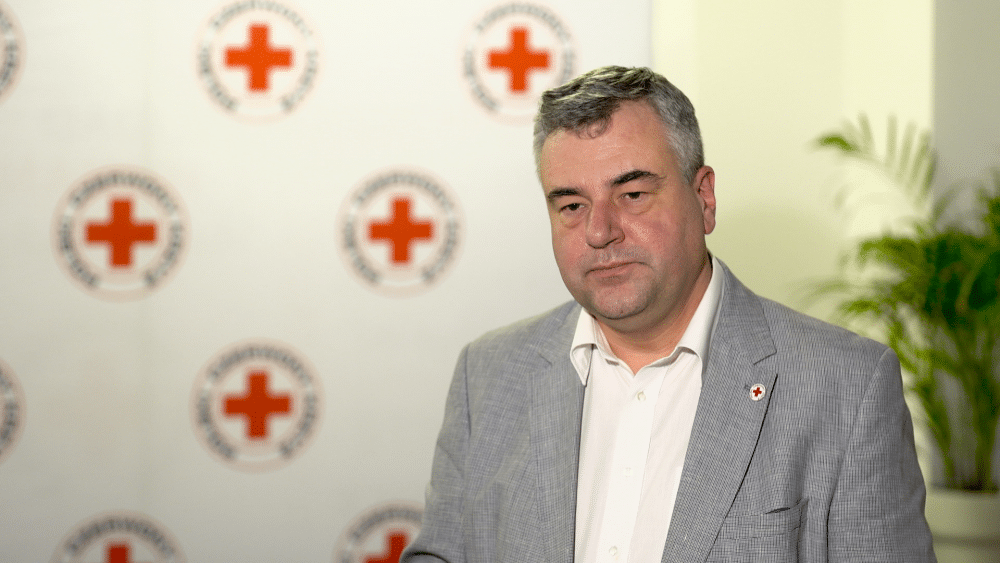Following the resumption of hostilities in the Gaza Strip in early December, the situation in the besieged enclave is dire and has spiralled out of control, warn aid organisations. Civilians are exposed to bombardments, without shelter, water, and food. The most challenging situation notably remains in Gaza city, where doctors and rescuers have trouble providing basic care. Many hospitals are out of service and ambulances have severe difficulties in transporting the injured. The aid that reaches the Gaza Strip is far from sufficient and does not meet basic needs.
– “We have an escalation of armed conflict in the Middle East, which unfortunately brings humanitarian challenges. Approximately 20,000 people are dead, and about 1.3 million had to leave their homes and move, not knowing whether they will be able to safely leave the battlefield. We are dealing with aid focused on saving human lives, providing aid in hospitals, but it is difficult to imagine that surgeries are being performed without electricity and anaesthetics,” says Michał Mikołajczyk, board member of the Polish Red Cross, to Newseria Biznes agency.
In early December, a week-long ceasefire between Israel and the Palestinian terrorist organization Hamas, which allowed the release of dozens of kidnapped hostages held in the Gaza Strip, came to an end. Humanitarian organizations warn that after resuming fighting, the situation in the besieged enclave is dire and uncontrollable. The region lacks drinking water and food, and the civilian population, exposed to bombings and shelling, suffers from hunger and spreading diseases. Infectious respiratory diseases, diarrhoea, dysentery, hepatitis, scabies, and lice are rapidly spreading. Access to toilets, bathrooms, and hygiene items is hindered, and people are even consuming inedible food. The streets are littered with garbage and sewage.
Refugee and aid sites, where people shelter in makeshift tents, are overcrowded, and the health care system has completely collapsed – overcrowded hospitals lack basic supplies, medications, anaesthetics, and often even electricity, resulting in operations and treating the injured under very makeshift conditions. Doctors and medical staff often provide help in the dark, in hallways, and are heavily stressed, working under immense pressure and very dangerous conditions.
-“Doctors, nurses, volunteers, and Red Cross employees are constantly at risk of loss of life and health, as we regularly receive information about convoys being shelled or buildings marked with the Red Cross emblem being bombed. Our people who are to render aid also die. Meanwhile, the Red Cross, the Red Crescent should be a protecting sign for each of the parties, in every conflict, because we currently have over 30 wars in the world. We appeal for respect for international law, humanitarian law, and basic rules protecting those who bring help,” stresses Michał Mikołajczyk.
The Gaza Strip, which is a small area that provides home to over 2 million people, making it one of the most densely populated areas globally. Aid in the region – to the best extent possible – is provided by the Palestinian Red Crescent, the Egyptian Red Crescent, and the Israeli Magen David Adom, which are affiliated with the International Red Cross, which recently also mediated the exchange of Israeli hostages held by Hamas in the Gaza Strip for two months.
“There are doctors, nurses, many psychologists, people dealing with migration issues, and providing legal aid. There are no representatives, volunteers, or employees of the Polish Red Cross, we are not directly there, but we operate through sister organizations and the International Red Cross,” says the board member of the Polish Red Cross.
For weeks, humanitarian organizations have been stressing that the aid reaching the Gaza Strip is far from sufficient and does not meet the basic needs of civilians. Therefore, the UN is pressuring Israel to allow more humanitarian convoys to enter the enclave.
“If we have a suspension of hostilities or an open border crossing, then some people can leave the battlefield, and trucks with aid can go in the opposite direction. About 4,500 trucks with aid have already been delivered there, these are, among others, dressings, food, water, very basic things to save human lives,” lists Michał Mikołajczyk.
Currently, the most challenging situation still prevails, including in Gaza, where doctors and rescuers struggle to provide basic aid.
“In response to the call of the International Red Cross, we have opened a collection, but perhaps the multitude of challenges and conflicts, and maybe a little fatigue, being on the front line of the Ukrainian conflict leads to the fact that this collection does not enjoy great interest and willingness to help from the Polish society,” says Michał Mikołajczyk. “Information about this collection under the slogan “Help for the Middle East” can be found on the pck.pl website and on our Facebook profile. We only collect financial resources, which we will transfer to the International Red Cross. They will be spent on what will be most needed, but from the information that comes to us from there, it turns out that it is still food, medicines, and dressings.”
